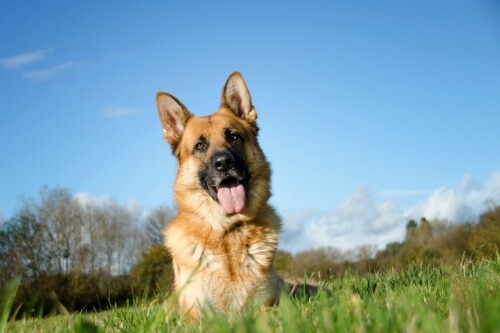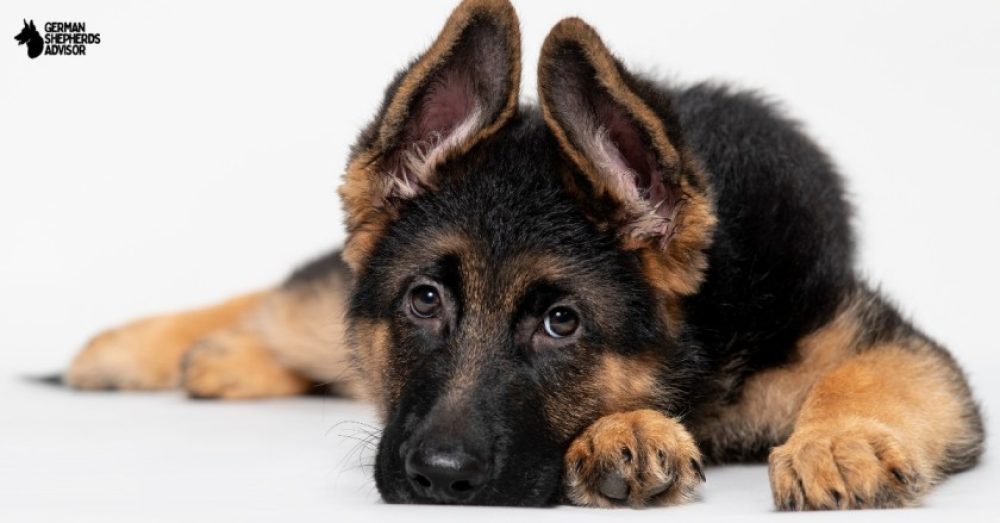German shepherds are a breed that is known to be highly active and require plenty of exercise. They are not recommended for people who cannot provide them with at least an hour of exercise each day. If left alone for an extended time, German shepherds can become destructive and engage in inappropriate behaviors, such as digging or chewing.
It is important to ensure your German shepherd has plenty of toys and things to keep him occupied when you’re not home. If you cannot provide your dog with enough exercise or if you are not able to properly supervise him, consider another breed of dog.
Can we leave german shepherd alone for long hours?
If you have a busy schedule and can’t always be home with your GSD, creating a routine for him during the day is important. Try to come home at lunchtime to give him a break from being alone and spend some time playing with him before you head back to work.
If you can’t get home during the day, ensure someone else can check in on your dog. A neighbor, family member, or friend would be a good option. Following these tips can help ensure your German shepherd is happy and healthy when you’re not around.
Leaving a German shepherd alone for six hours isn’t recommended, as the dog may become anxious or restless. If you must leave your dog alone for an extended time, make sure he has plenty of toys and chew bones to keep him occupied and take him for a long walk before you leave, so he’ll be tired when you’re gone. Consider hiring a pet sitter to watch your dog while you’re away.
Leave him inside or outside?
No definitive answer is whether you should leave your German shepherd inside or outside. It depends on various factors, including your dog’s personality, the climate where you live, and how much exercise your dog needs. If you live in a warm climate and your German shepherd is an active breed that needs plenty of activities, let him run and play outdoors.
However, if you live in a colder climate or your dog is inactive, keeping him inside may be better. It is important to remember that dogs are social animals and need companionship. If you are away from home for a long time, it is best to leave your dog inside. This will make him lonely and cause problems such as barking or chewing on your belongings. If you decide to keep your dog outside, providing a warm shelter, fresh water, and regular meals is important.
It would be best to ensure he has plenty of daily exercise. Playing with your dog in the house when the weather outside is bad can be a good idea. You should also consider keeping a companion dog inside if you leave yours out for a long time – this will keep your German shepherd happy and less lonely while you are gone.
Ways to make your German Shepherd Calmer before you leave

If your German Shepherd tends to be a destructive chewer or digger, you must train him not to do these things as soon as possible. After all, if you have a “big” dog, he’ll probably find a way to get what he wants – no matter how big or expensive – and then go ahead and destroy it! While training does take time, the sooner you start, the better. It’s best if your pup is still a young adult – around one year of age – when he begins training lessons.
Here are some tips on teaching your puppy not to chew or dig:
Provide him with lots of sturdy toys that he can play with instead of chewing on the household. Provide plenty of mental stimulation with a classically-conditioned toy. Don’t train a pup to use a crate as punishment – this will cause him to become very anxious whenever he’s in his kennel!
Keep your living room free from plants and other items that an overzealous digger could destroy. And never leave shoes or clothing lying on the floor – your German Shepherd might decide they’re fair game for destruction!
If you want to teach your pup not to destroy everyday household objects, buy inexpensive “bouncy balls” at non-pet supply stores (i.e., Walmart). Dog toys made specifically for dogs tend to be too expensive, and many pups can easily tear them apart. You want something durable but also inexpensive.
A dog like a German Shepherd might try to chew on your things – such as couches, chairs, and legs – which is why these objects should be put away when he’s playing in the house!
How you train your pup depends on his temperament and what works best for him. You can teach using positive or negative reinforcement or a mixture of both. However, you must be patient and consistent throughout the training process because it takes time to successfully break habits formed over months (or even years!)
You’re The Alpha Dog – You need to establish yourself as “alpha.” This means setting rules and boundaries which you expect your puppy to follow. It is important to do this now; if you don’t, you may have to face problems later.
One of the first things you must teach your dog is that you’re not playing games with him – he must constantly obey his training commands. With a German Shepherd, being consistent and patient when training is essential because they can be very stubborn!
For example, if your German Shepherd decides he wants a snack before dinner time – and there happens to be a bag of chips lying out – don’t give in! If you do, he’ll come back for more food every day at dinnertime! Don’t let friends or family members feed your pup treats or snacks whenever he barks.
Your German Shepherd must learn that barking never gets him what he wants – only good behavior will! Never allow your dog to run free with your guests, young children included. Your German Shepherd is likely talented at “guarding” his territory (i.e., you!) and may slip into aggressive behavior if he becomes protective of what belongs to him (you).
Don’t let overhanging drapes or other furniture be an invitation for destruction either – teach your pup not to attack any hanging objects now so he’ll know it’s completely off-limits!
It might seem like a lot of work, but training can be fun for you and your pup! Most importantly, you must ensure that you pronounce the word “No” harshly whenever he does something wrong. This way, he will eventually learn that “No” means what he did was wrong, and he will begin to stop the behavior.
Don’t give up if your German Shepherd doesn’t understand these words first! It’s always better to repeat yourself than allow your dog to do something that could end up causing him any trouble (i.e., chewing on the couch!) If you’re consistent, giving commands with a harsh tone when he does something forbidden, eventually, he’ll learn his boundaries and what is expected of him. Now go out there and have fun training your German Shepherd!
Owning a german shepherd and working full time

Owning a German shepherd and working full-time can be challenging but doable. Here are some tips to help make things easier.
First, make sure you have a good crate or kennel for your dog. This is essential if you won’t be able to let your dog out during the day. A good kennel will keep your dog safe and comfortable, and it will also help to potty train your dog more quickly.
Second, make sure you have a good obedience training program in place. A well-trained German shepherd can greatly help manage distractions and keep your home clean.
Third, be sure to get plenty of exercise for your dog. A tired dog is a good dog, and with a busy schedule, it can be tough to ensure your dog gets enough exercise. Luckily, German shepherds are a very active breed, and they love to run and play. Make sure you take your dog on plenty of walks and give him plenty of chances to get outside and play.
Fourth, make sure you have a good supply of chew toys. German shepherds are prone to chewing, so it’s important to have some toys around to keep them occupied and out of trouble.
Finally, be patient and consistent with your training. Training a dog may take longer when you’re working full-time, but it’s doable. Ensure you keep going even if things take longer than usual. Keep at it daily; soon, your dog will be well-trained and well-behaved. If you are a full-time worker and own a German shepherd, keep a few things in mind.
First, having someone who can come home during the day to let your dog out and exercise him is important.
Secondly, ensure your dog has a comfortable place to sleep and plenty of toys to keep him occupied.
And finally, be sure to give your dog plenty of attention and love – even if you’re tired from work, he’ll appreciate it!
Owning a German shepherd can be a lot of work, but it’s worth it.
Your German shepherd can become anxious or restless after you leave, depending on what has happened. You can help prevent anxiety by training him to look forward to your departures and arrivals. This can be done by giving him a tasty treat when you come home (or before you leave) and giving him attention-such by petting or playing with him right afterward.
Except when you are forced to discipline your dog, he must always look forward to seeing you because he should never learn that being left alone can lead to negative experiences. The same goes for separation anxiety; if your dog can’t go five minutes without freaking out at the sight of his leash, don’t put it on unless you’re leaving.
Start by leaving him alone for just a couple of seconds at a time and gradually increase the duration of your departures until he can handle being alone for 30 minutes or more. If you have to leave him for longer periods of time, consider hiring a pet sitter to keep an eye on him. That way, you can be assured that he’s getting the attention he needs and won’t be too anxious while you’re away.
Ensuring your German shepherd is exercised correctly can help alleviate some of the anxiety caused by being left alone. A long walk before you leave will tire out your dog and make it less likely that he’ll become restless or destructive while you’re gone. In addition to walks, provide your pet with plenty of toys and chew bones to keep him occupied.
This can help reduce the chances that he’ll become anxious or restless. Hiring a pet sitter can be a good solution if you have to leave your dog for an extended time. That way, your pet will get the attention he needs, and you can rest assured knowing he’s in good hands.
Leaving a German shepherd alone for six hours can lead to anxiety and restlessness in the dog. If you must leave your dog alone, make sure he has plenty of toys and chew bones to keep him occupied and take him for a long walk before you leave, so he’ll be tired when you’re gone. Consider hiring a pet sitter to watch your dog while you’re away.
How to Entertain Your German Shepherd While You’re Gone?
Your German shepherd has been alone all day while you were at work. Other than your trips to the pet food store, it’s likely that there were few or no other humans taking time to interact with or play with your dog during the day. This means that when you come home, your dog may be incredibly excited to see you!
While having a dog who loves you unconditionally is great, this over-excitement can present some problems if left unchecked. Not only is such behavior potentially dangerous for your German shepherd due to his jumping and mouthing (not to mention yours), but it also becomes a problem when guests come over and behave similarly.
Your GSD will learn from his environment, so if guests are over-excited when they come to your house, your dog will likely grow up thinking it’s normal to be over-excited when guests arrive.
So what can you do? There are quite a few things, and the tips below should help in keeping everyone safe and happy:
- Teach Your German Shepherd How to Entertain Himself
- Provide Your GSD With Chew Toys
- Prepare for your Return Home
- Leave For Short Periods of Time
- Get Your GSD Exercised Before You Leave
- Learn to Read Your German Shepherd’s Body Language
What age can a puppy be left alone?
People want to know if they should leave their puppy alone. The answer depends on the pup’s age, temperament, and past experiences. Puppies start being able to spend time alone when they are about three months old, but they are never ready at any particular age.
Getting used to being left alone is a gradual process, so you see very different behaviors in puppies of the same breed or mix of breeds at young ages. The best indicator of future behavior is experienced, so anything your dog has had a chance to get used to will be less stressful for him as he matures.
For some people, it may be all right, even with an older dog, if there is enough outside activity available for him during the day so that he doesn’t get overly bored.
In the meantime, if you’re unsure whether you should leave your pup alone, it’s always best to err on the side of caution and not leave him home alone. Too many things can go wrong, like a fire or a burglary, and it’s not worth taking the chance. Better to have someone come over to check in on him every few hours or ask a friend or neighbor to stop by and let the pup out for a potty break.







